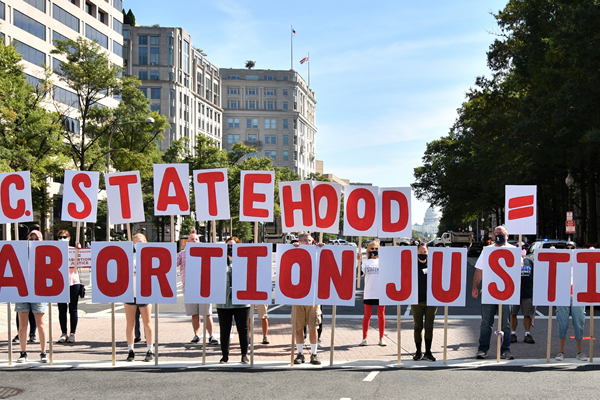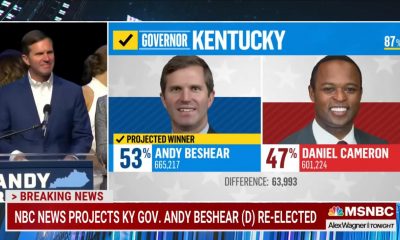National
Legal advocates turn attention to Supreme Court abortion cases
No major LGBTQ rights cases before court this term

With the new term for the U.S. Supreme Court underway, justices for the first time in years won’t have to consider a major case specifically impacting LGBTQ rights, which legal advocates say will lead to them to focus their attention on high-profile cases that challenge a woman’s right to access abortion.
At the top of the watch list for court, which now has 6-3 conservative majority as a result of appointments under former President Trump, is Dobbs v. Jackson Women’s Health Organization, which will determine the constitutionality of the Mississippi law banning abortion after 15 weeks and is widely considered a direct challenge to long-standing precedent established by Roe v. Wade guaranteeing a right to abortion. The Texas law banning any abortion after six weeks, which the Supreme Court allowed to take effect as litigation against it proceeds, is still pending in lower courts, but will likely reach the high court soon.
For many LGBTQ legal advocates, the abortion cases are important because they say the outcome could directly impact legal precedent underpinning major Supreme Court decisions in favor, including the 2003 decision of Lawrence v. Texas, which struck down state bans on sodomy, and the 2015 decision of Obergefell v. Hodges in favor of same-sex marriage nationwide.
Camilla Taylor, director of constitutional litigation for Lambda Legal, said the outcome abortion cases is crucial not only because LGBTQ people need access to abortion.
“Just as importantly, there are a lot of ways in which the landmark precedents that we obtained that vindicate the rights of LGBT people rely upon a foundation of substantive due process precedent that includes Roe v. Wade, and other cases dealing with reproductive health,” Taylor said. “So, if Roe versus Wade crumbles, then the foundation on which our own cases also crumbles.”
As such, a coalition of LGBTQ legal groups—including the National Center for Lesbian Rights, the National Center for Transgender Equality and Equality California—was among those who filed a friend-of-the-court brief in September arguing the Mississippi law is unconstitutional.
Key among the arguments is the denial of abortion access is a form of sex discrimination, just as the Supreme Court determined last year in Bostock v. Clayton County that anti-LGBTQ discrimination is a form of sex discrimination, this illegal under the Civil Rights Act of 1964.
“By the same logic, laws that restrict abortion also facially discriminate based on sex,” the brief says, “Like being LGBTQ, pregnancy is a sex-based characteristic; it is ‘inextricably bound up with’ an individual’s sex. Accordingly, laws that force a pregnant woman to bear a child necessarily discriminate based on sex, as would a law that barred a reproductive medical procedure available only to men.”
It’s true that both Roe v. Wade and the Supreme Court’s decision for LGBTQ were based on principals of due process and equal protection under the 5th and 14th Amendments of the U.S. Constitution. But not all legal experts agree LGBTQ rights are on the line depending on the outcome of abortion litigation.
Dale Carpenter, a conservative law professor at the SMU (Southern Methodist University) Dedman School of Law who’s written in favor of LGBTQ rights, said the Supreme Court is “probably going to write a narrower opinion, if it even overrules Roe,” but won’t issue a radical decision “that reaches out and destroys all unenumerated rights.”
“Obergefell relies on the fundamental right to marry,” Carpenter said. “There’s no chance the Supreme Court is going to say there is no right to a fundamental right to marry. The doctrine upon which Obergefell rests is on much more solid footing than abortion rights. The basic doctrine underlying Obergefell has never seriously been challenged; abortion rights have been for 50 years.”
Other key differences between the right to abortion and same-sex marriage, Carpenter said, are an arguable state interest in protecting fetal life and reliance interests in the case of marriage rights given thousands of same-sex couples have wed in the wake of the Obergefell decision.
But what about Lawrence v. Texas, which were both that LGBTQ rights decision and Roe v. Wade decided at least in part on finding an unenumerated right to privacy in the constitution? Carpenter said a Supreme Court decision undoing a right to privacy would mean undoing nearly 60-year precedent that began with the 1965 decision in Griswold v. Connecticut, which overturned a state ban on contraceptives.
“There’s not even a single brief in the case, that I know of, on the anti-abortion side that’s supporting that,” Carpenter said.
Carpenter concluded with a wry jab: “By the way, the LGBT rights advocates who are now saying that these LGBT rights decisions are in danger will be the same people say after Roe is a overruled that those decisions are not affected.”
Indeed, the Supreme Court under its current 6-3 conservative makeup had an opportunity to take up an Indiana birth certificate case, Box v. Henderson, that was a direct challenge to the Obergefell marriage decision, but declined to take up the case. No state is any where close to recriminalizing sexual relations for same-sex couples, which in 2021 would widely be seen as a human rights violation.
But legal advocates for the LGBTQ community aren’t limiting the relationship between abortion and LGBTQ rights to legal principles. Additionally, the identify solidarity with another minority group under siege, in this case women seeking access to abortion, and need among certain members of the LGBTQ community—lesbian and bisexual women, transgender men and non-binary people—to have the access to abortion.
Shannon Minter, legal director for the National Center for Lesbian Rights, echoed the sense LGBTQ legal advocates are focused on abortion cases, but cited “overlap between the reproductive rights, and justice movement and the LGBTQ movements.”
“What we see is the primary impact of this case on our community is a very direct one,” Minter said. “It’s extremely direct. The ability to obtain abortions is of great importance to women in our community, and also to transgender men and non-binary people as well.”
Minter cited data finding upwards of 80 percent of bisexual women will experience pregnancy over their lives and said LGBTQ women “are significantly more likely to have unintended pregnancies as a result of sexual violence, which is very distressing, but that is a reality for our community.”
Lesbian young adults and adolescents are at particular risk for unwanted pregnancy, Minter added, because there’s still “so much stigma and discrimination that they tried to sort of hide their sexual orientation, and prove that they’re straight when they’re not, so they actually have high rates of unprotected sex.”
Religious schools funding, gun control, Obamacare on docket
The abortion cases aren’t the only litigation on the radar for LGBTQ legal advocates. Also on the list are cases that will determine whether Maine religious schools have access to public funds, the legality of New York State gun regulations and disparate impact claims under Obamacare.
Taylor said the case of CVS Pharmacy v. Doe before the Supreme Court, which was brought by people living with HIV/AIDS, will determine whether disparate impact claims are cognizable in the context of disabilities under the Affordable Care Act.
“That’s really important for people living with HIV and other people with disabilities,” Taylor said. “It could do a lot of harm.”
The oral arguments in the Dobbs case are set to take place before the Supreme Court on Dec. 1.
Federal Government
Lambda Legal praises Biden-Harris administration’s finalized Title IX regulations
New rules to take effect Aug. 1

The Biden-Harris administration’s revised Title IX policy “protects LGBTQ+ students from discrimination and other abuse,” Lambda Legal said in a statement praising the U.S. Department of Education’s issuance of the final rule on Friday.
Slated to take effect on Aug. 1, the new regulations constitute an expansion of the 1972 Title IX civil rights law, which prohibits sex-based discrimination in education programs that receive federal funding.
Pursuant to the U.S. Supreme Court’s ruling in the landmark 2020 Bostock v. Clayton County case, the department’s revised policy clarifies that discrimination on the basis of sexual orientation and gender identity constitutes sex-based discrimination as defined under the law.
“These regulations make it crystal clear that everyone can access schools that are safe, welcoming and that respect their rights,” Education Secretary Miguel Cardona said during a call with reporters on Thursday.
While the new rule does not provide guidance on whether schools must allow transgender students to play on sports teams corresponding with their gender identity to comply with Title IX, the question is addressed in a separate rule proposed by the agency in April.
The administration’s new policy also reverses some Trump-era Title IX rules governing how schools must respond to reports of sexual harassment and sexual assault, which were widely seen as imbalanced in favor of the accused.
Jennifer Klein, the director of the White House Gender Policy Council, said during Thursday’s call that the department sought to strike a balance with respect to these issues, “reaffirming our longstanding commitment to fundamental fairness.”
“We applaud the Biden administration’s action to rescind the legally unsound, cruel, and dangerous sexual harassment and assault rule of the previous administration,” Lambda Legal Nonbinary and Transgender Rights Project Director Sasha Buchert said in the group’s statement on Friday.
“Today’s rule instead appropriately underscores that Title IX’s civil rights protections clearly cover LGBTQ+ students, as well as survivors and pregnant and parenting students across race and gender identity,” she said. “Schools must be places where students can learn and thrive free of harassment, discrimination, and other abuse.”
Michigan
Mich. Democrats spar over LGBTQ-inclusive hate crimes law
Lawmakers disagree on just what kind of statute to pass

Michigan could soon become the latest state to pass an LGBTQ-inclusive hate crime law, but the state’s Democratic lawmakers disagree on just what kind of law they should pass.
Currently, Michigan’s Ethnic Intimidation Act only offers limited protections to victims of crime motivated by their “race, color, religion, gender, or national origin.” Bills proposed by Democratic lawmakers expand the list to include “actual or perceived race, color, religion, gender, sexual orientation, gender identity or expression, ethnicity, physical or mental disability, age, national origin, or association or affiliation with any such individuals.”
Democratic Gov. Gretchen Whitmer and Attorney General Dana Nessel have both advocated for a hate crime law, but house and senate Democrats have each passed different hate crimes packages, and Nessel has blasted both as being too weak.
Under the house proposal that passed last year (House Bill 4474), a first offense would be punishable with a $2,000 fine, up to two years in prison, or both. Penalties double for a second offense, and if a gun or other dangerous weapons is involved, the maximum penalty is six years in prison and a fine of $7,500.
But that proposal stalled when it reached the senate, after far-right news outlets and Fox News reported misinformation that the bill only protected LGBTQ people and would make misgendering a trans person a crime. State Rep. Noah Arbit, the bill’s sponsor, was also made the subject of a recall effort, which ultimately failed.
Arbit submitted a new version of the bill (House Bill 5288) that added sections clarifying that misgendering a person, “intentionally or unintentionally” is not a hate crime, although the latest version (House Bill 5400) of the bill omits this language.
That bill has since stalled in a house committee, in part because the Democrats lost their house majority last November, when two Democratic representatives resigned after being elected mayors. The Democrats regained their house majority last night by winning two special elections.
Meanwhile, the senate passed a different package of hate crime bills sponsored by state Sen. Sylvia Santana (Senate Bill 600) in March that includes much lighter sentences, as well as a clause ensuring that misgendering a person is not a hate crime.
Under the senate bill, if the first offense is only a threat, it would be a misdemeanor punishable by one year in prison and up to $1,000 fine. A subsequent offense or first violent hate crime, including stalking, would be a felony that attracts double the punishment.
Multiple calls and emails from the Washington Blade to both Arbit and Santana requesting comment on the bills for this story went unanswered.
The attorney general’s office sent a statement to the Blade supporting stronger hate crime legislation.
“As a career prosecutor, [Nessel] has seen firsthand how the state’s weak Ethnic Intimidation Act (not updated since the late 1980’s) does not allow for meaningful law enforcement and court intervention before threats become violent and deadly, nor does it consider significant bases for bias. It is our hope that the legislature will pass robust, much-needed updates to this statute,” the statement says.
But Nessel, who has herself been the victim of racially motivated threats, has also blasted all of the bills presented by Democrats as not going far enough.
“Two years is nothing … Why not just give them a parking ticket?” Nessel told Bridge Michigan.
Nessel blames a bizarre alliance far-right and far-left forces that have doomed tougher laws.
“You have this confluence of forces on the far right … this insistence that the First Amendment protects this language, or that the Second Amendment protects the ability to possess firearms under almost any and all circumstances,” Nessel said. “But then you also have the far left that argues basically no one should go to jail or prison for any offense ever.”
The legislature did manage to pass an “institutional desecration” law last year that penalizes hate-motivated vandalism to churches, schools, museums, and community centers, and is LGBTQ-inclusive.
According to data from the U.S. Department of Justice, reported hate crime incidents have been skyrocketing, with attacks motivated by sexual orientation surging by 70 percent from 2020 to 2022, the last year for which data is available.
Twenty-two states, D.C., Puerto Rico, and the U.S. Virgin Islands have passed LGBTQ-inclusive hate crime laws. Another 11 states have hate crime laws that include protections for “sexual orientation” but not “gender identity.”
Michigan Democrats have advanced several key LGBTQ rights priorities since they took unified control of the legislature in 2023. A long-stalled comprehensive anti-discrimination law was passed last year, as did a conversion therapy ban. Last month the legislature updated family law to make surrogacy easier for all couples, including same-sex couples.
A bill to ban the “gay panic” defense has passed the state house and was due for a Senate committee hearing on Wednesday.
Indiana
Drag queen announces run for mayor of Ind. city
Branden Blaettne seeking Fort Wayne’s top office

In a Facebook post Tuesday, a local drag personality announced he was running for the office of mayor once held by the late Fort Wayne Mayor Tom Henry, who died last month just a few months into his fifth term.
Henry was recently diagnosed with late-stage stomach cancer and experienced an emergency that landed him in hospice care. He died shortly after.
WPTA, a local television station, reported that Fort Wayne resident Branden Blaettne, whose drag name is Della Licious, confirmed he filed paperwork to be one of the candidates seeking to finish out the fifth term of the late mayor.
Blaettner, who is a community organizer, told WPTA he doesn’t want to “get Fort Wayne back on track,” but rather keep the momentum started by Henry going while giving a platform to the disenfranchised groups in the community. Blaettner said he doesn’t think his local fame as a drag queen will hold him back.
“It’s easy to have a platform when you wear platform heels,” Blaettner told WPTA. “The status quo has left a lot of people out in the cold — both figuratively and literally,” Blaettner added.

The Indiana Capital Chronicle reported that state Rep. Phil GiaQuinta, who has led the Indiana House Democratic caucus since 2018, has added his name to a growing list of Fort Wayne politicos who want to be the city’s next mayor. A caucus of precinct committee persons will choose the new mayor.
According to the Fort Wayne Journal Gazette, the deadline for residents to file candidacy was 10:30 a.m. on Wednesday. A town hall with the candidates is scheduled for 6 p.m. on Thursday at Franklin School Park. The caucus is set for 10:30 a.m. on April 20 at the Lincoln Financial Event Center at Parkview Field.
At least six candidates so far have announced they will run in the caucus. They include Branden Blaettne, GiaQuinta, City Councilwoman Michelle Chambers, City Councilwoman Sharon Tucker, former city- and county-council candidate Palermo Galindo, and 2023 Democratic primary mayoral candidate Jorge Fernandez.
-

 District of Columbia2 days ago
District of Columbia2 days agoReenactment of first gay rights picket at White House draws interest of tourists
-

 District of Columbia2 days ago
District of Columbia2 days agoNew D.C. LGBTQ+ bar Crush set to open April 19
-

 Arizona2 days ago
Arizona2 days agoAriz. governor vetoes anti-transgender, Ten Commandments bill
-

 Africa4 days ago
Africa4 days agoUgandan activists appeal ruling that upheld Anti-Homosexuality Act












